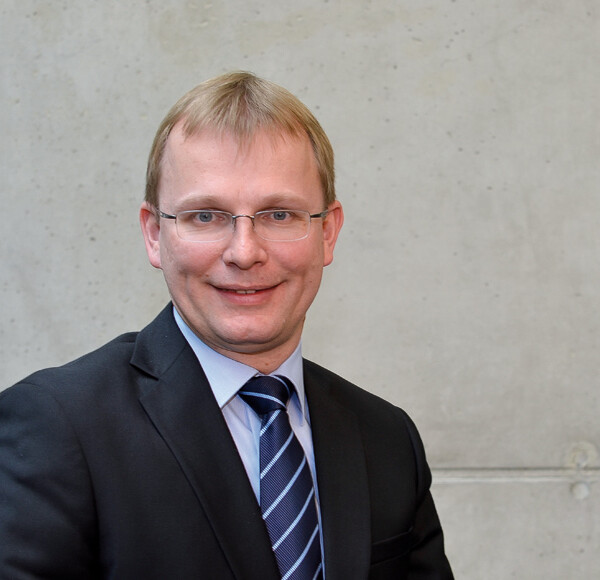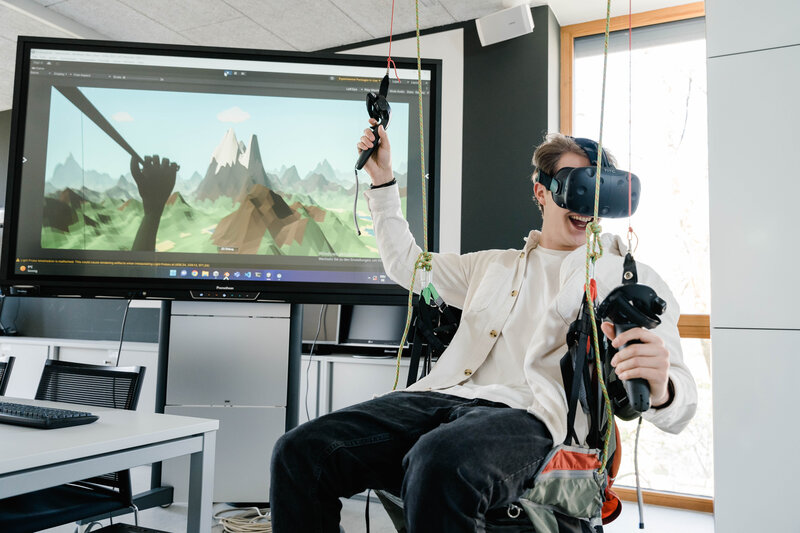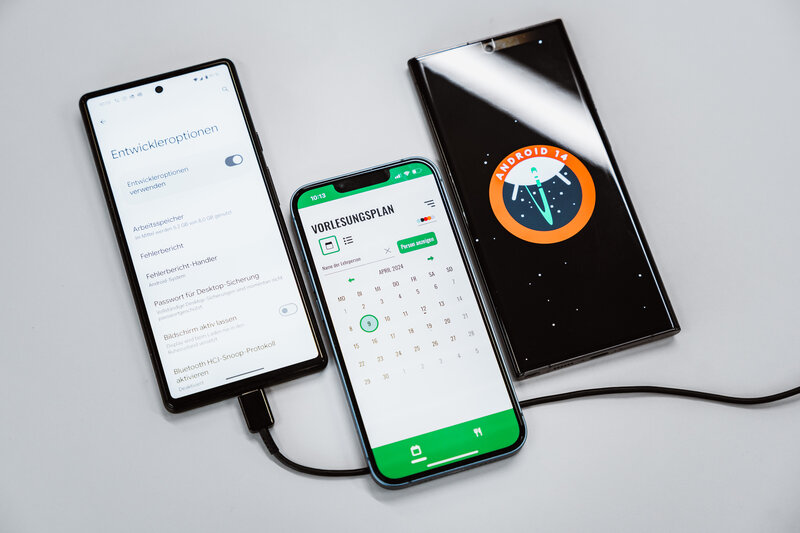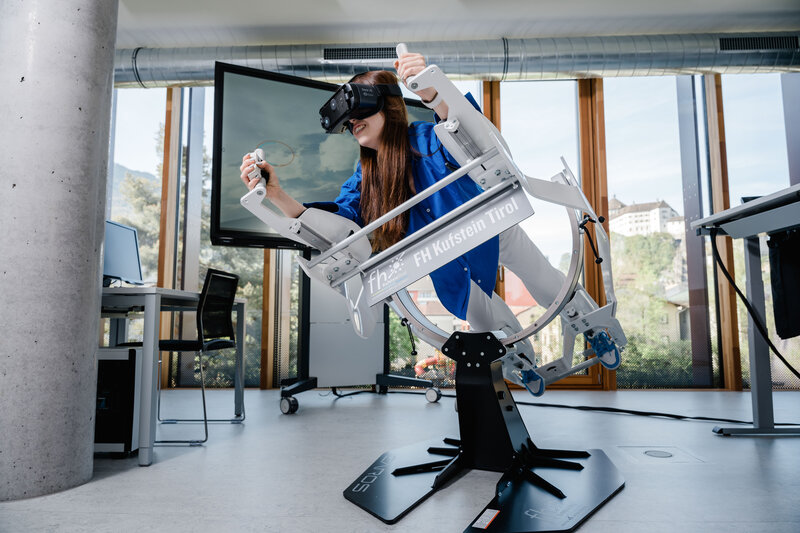Our full-time bachelor’s degree program emphasizes software development for web and mobile platforms, along with cloud computing and software engineering. You will learn design principles and work with modern tools to bring your own app ideas to life. Step into the world of digital innovation and become a creator!

Coding & Digital Design
Bachelor's degree program
Overview
-
Qualification Level:
Stufe 1, Bachelor -
Price:
Euro 363,36* (excl. Student Union-fees) each semester -
Academic Degree:
Bachelor of Science in Engineering (BSc) -
Academic Program:
Full-time -
Language:
60 % German, 40 % English -
Remote Options:
E-Learning max. 30 % online -
Exchange Semester:
Organized stay abroad, 5th semester, internship in the 6th semester (also possible abroad)** -
Admission Requirements:
General admission requirements -
Study Places per Year:
30
Study program accredited by the Agency for Quality Assurance and Accreditation Austria

Program Description
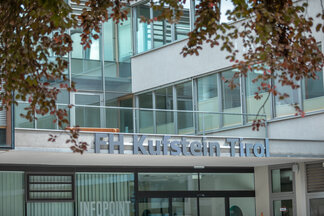


Explore the Coding & Digital Design degree program, where you will master both software development and design. We focus on giving you a comprehensive understanding of digital applications - from concept to completion. Our aim is to equip you with the skills to turn your creative app ideas into reality.
The Coding & Digital Design degree program offers expertise in both software development and design, providing a well-rounded understanding of digital applications. Students gain the skills needed to independently develop and creatively design their own projects. The curriculum covers software development, web and mobile applications, and key topics such as cloud computing, software engineering, and front-end and back-end development. In the design component, students use modern tools to create media content and bring their own ideas to life.
Study Focus
-
25 %
Software development
-
25 %
Design
-
25 %
Transfer of practical experience
-
25 %
Complementary contents
What You Will Learn
-
Developing web applications
-
Developing mobile apps
-
Basics of digital design
-
Modern design tools
-
Creative software design
-
Digital product planning and marketing
Popular Occupational Fields
- Software development for web and mobile
- Software and application design
- Project management for digital products
- IT consulting
- IT service
- Self-employed entrepreneurial activity
Career Opportunities
-
430+ vacancies
in IT and data analysis in Tyrol
-
EUR 50,200 average salary
for employees in the IT/data analysis sector in Austria in 2022 (according to WeAreDevelopers)
-
EUR 30.8 billion budget
for investments in IT and data processing in Austria in 2021 (according to Statista); still growing
-
+27.48 % revenue growth
in the IT services market in Austria between 2024 and 2028
-
+3,7 % growth
in the European IT and data sector (according to Gartner 2023); trend continues
The path to the Bachelor's Degree

The degree program spans six semesters. In the first two semesters, students build a foundation in coding and design, which is further developed during the 3rd and 4th semesters. The 5th semester is dedicated to studying abroad, allowing students to broaden their knowledge in an international setting. In the 6th semester, students complete an internship and work on their bachelor’s thesis.
Special features:
-
Practical knowledge transfer from day one
-
Integrated semester abroad in 5th semester
-
Integrated internship in 6th semester for optimal career start
Recognition of Prior Learning
Students have the option to receive credit for skills and competencies they have already acquired before the start of each semester.
To apply for credit, they must submit a request directly to the Director of Studies.
Director of Studies

Prof. (FH) Lukas Demetz, PhD
Head of IT Services & Software Development | Interim Director of Studies Bachelor Coding & Digital Design | Master Data Science & Intelligent Analytics, Web Engineering & IT Solutions
Curriculum
- Basics of database systems and data management
- Data modeling (single entity, attributes, cardinality, conditionality, relationship types)
- Key candidates, super keys, and primary keys
- Normalization of data structures (at least 1, 2, 3)
- Interaction with relational databases with the support of SQL in the areas of DDL, DML, and DQL
- Basic database management activities on advanced database concepts in the area of NoSQL
- Propositional logic and logical operators, predicate logic, arithmetic laws of propositional and predicate logic
- Set theory: basic concepts, set operators, arithmetic rules for sets
- Relations: Basic concepts, properties of relations, equivalence, and ordering relations
- Number concepts: Sets of numbers, sum and product signs, place value systems, binary and hexadecimal systems
- Sequences: Concept of sequence, some essential properties, convergence, O-notation
- Modular arithmetic: concept and calculation rules, applications
A generally valid module description for the semester abroad cannot and should not be defined due to the large number of partner universities and the choices offered there within the information technology-oriented sciences (computer science, business informatics, information management, and related disciplines) in order to ensure freedom for stu-dents.
The national credits are converted individually into ECTS points in accordance with the achievements demonstrated. The students are subject to the respective examination modalities at the partner university.
The courses listed below are, therefore, to be regarded as examples:
- Advanced Programming
- Database Design & Development
- Multimedia Technologies
- Web Technology
- Mobile Technologies
- Enterprise Development & Enterprise Integration
- Introductory courses in Game Design
- Augmented and Virtual Reality
- Human-Computer Interaction and User Experience Design (UX)
- Software Engineering and Testing
A generally valid module description for the semester abroad cannot and should not be defined due to the large number of partner universities and the options offered there within the design-oriented sciences in order to ensure freedom for students. The content of teaching is based on the fundamentals and specializations of the individual disciplines in the economic subject areas of the degree program. The national credits are converted individually into ECTS points in accordance with the achievements demonstrated. Students are subject to the respective examination modalities at the partner university.
Some examples of possible subject areas are shown below:
- Design basics
- Design techniques
- Design tools
- Object design (e.g., 3D objects)
- Animation
- Game design
- Usability/user experience
- Web/mobile design
A generally valid module description for the semester abroad cannot and should not be defined due to the large number of partner universities and the choices offered there within the economically oriented sciences in order to ensure free-dom for the students. The content of teaching is based on the fundamentals and specializations of the individual disci-plines in the economic subject areas of the degree program. The national credits are converted individually into ECTS points in accordance with the achievements demonstrated. Students are subject to the respective examination modali-ties at the partner university.
Some examples of possible subject areas are shown below:
- Organizational Management
- Accounting
- Controlling
- Sales Management
- Marketing and Corporate Communication
- Strategic Management
- Corporate Management
- Procurement, Production and Logistics
- Business Informatics
- e-Commerce & e-Business
- Information Management
As part of the seminar, students present and analyze their experiences during their stay abroad. The aim is to put their individual experiences into an academic context (intercultural discourse, intercultural awareness and understanding, etc.), discuss them with their fellow students, and compare them with their experiences. In order to achieve a stronger bond between the students and the FH Kufstein during their semester abroad, to strengthen the cohesion of the cohort, and to promote an exchange of experiences between the students, this course is conducted during the semester abroad with the support of eLearning methods. The content of teaching is a structured reflection on the similarities and contra-dictions of theoretical teaching knowledge and practical applications in order to achieve a critical reflection ability for the theory-practice friction surface in the sense of a synthesis of both for professional practice. Individual experiences are critically reflected upon together in group discussions structured by the course instructor (e.g., via forums and chats).
The subject of this introductory course is the technological foundations of the web and all critical implementation technologies in this context (HTML, CSS). Students are introduced to the entire development process of a web applica-tion (design, wireframing, implementation, testing, operation, and maintenance), with a particular focus on the inter-face between web design and web programming. Special focus is placed on omnipresent web technologies that are widely used, such as the HTTP protocol for communication between the web server and client, HTML, and CSS as primary tools for the display aspects on the client side. The basics of Internet programming, page coding with the markup and markup language HTML, basic formatting, tables, forms, and CSS basics (structure of CSS files, selectors, simple formatting options, dynamic display effects) are taught. Furthermore, students are taught how to create appeal-ing websites and web applications. In addition to technological standards, this also includes specialist knowledge in the areas of layout and perception, typography (readability and font formats), and color theory (color schemes and color effects).
This course provides a solid foundation for students to develop their web design and product development skills further and successfully apply them in the marketplace.
Editing and design basics in Adobe, such as
- General program functions and work interfaces
- Drawing tools
- Layer technique
- Selection functions
- Crop tools
- Colors and formatting
- objects
- Image editing
- Composing
- Texture/ Patterns/ Artboards
- Alienation
- Backgrounds
- Text editing
- Template creation
- Rulers, guides, grids
- Import / export / vectorization
- Wireframing, handling wireframing technologies
- Mockup design and implementation using Photoshop, Illustrator, or XD
- Icon and pictogram design: Dos and don'ts
- Basic principles of modeling, material creation, lighting, animation, and rendering of virtual scenes
- Mapping of transformations, local and global coordinate systems, as well as definition and control of the virtual camera
- Overview of essential modeling tools and modifiers (e.g., included in Maya included in Maya, 3D Studio Max, and Blender)
- Modeling of polygonal meshes and using parametric curves and surfaces (splines, NURBS)
- Common light source types and lighting models, as well as the creation of realistic shadows for real-time applications
- Material definition and physical effects such as reflection, refraction, translucency, and dispersion
- Texturing of models, UV mapping, and procedural textures
- Overview of advanced material and lighting techniques such as IES, HDRI, IBL, and skydomes
- Keyframe animation, interpolation of transformations, gimbal lock, and path animation
- Creation of animation sequences with animation curves and actions
- Animation of characters using cinematic models (rigging, skinning)
Students learn to assess the benefits of websites and web applications based on usability criteria. This section also includes methods for usability evaluation and covers the basics of technical and content-related usability.
- Practical examples that are processed with the support of modern project management software (e.g., Gitlab)
- Project planning: issues, issues board, milestone tracking
- Project controlling: work breakdown structures and other performance, resource, and cost planning tools
- Process models: using SCRUM as an example
- Documentation: IT-supported documentation with modern project management tools (e.g. Gitlab)
Accounting:
- Fundamentals of accounting
- Revenue and expenditure accounting
- Tasks of cost accounting
- Cost accounting Pricing: Purchase, difference and sales costing, actual cost accounting
Business administration:
- Business basics (company, company name, company register, legal forms, sales contracts and their laws)
- Equity financing, restructuring financing, debt financing, modern types of financing
- Business plan incl. financial plan
- Strategic management: Planning and analyses
- Static and dynamic methods of investment calculation
Economics:
- Fundamentals of economics
- Market theory and price theory
- Fundamentals of microeconomics, macroeconomics, network economics
- GDP, HDI, inflation, deflation, stagflation
- Introduction to Web Business: basics of online business, e-commerce models, online marketplaces and platforms
- Website development and design: creating engaging and user-friendly websites, website hosting and maintenance - E-commerce strategies: e-commerce business models, payment processing, security and Data protection
- Web analytics and tracking: Using tools such as Google Analytics to measure and analyze website traffic and conversions
- Conversion optimization: technologies to increase conversion rates, A/B testing, and user experience optimization
- Data-Driven Decision Making: web analytics supported business decisions in web business
- Fundamentals of online marketing.
- Content strategy: planning and creating content for websites and social media, storytelling and branding
- Trends in web business and web marketing: current news and future trends in the digital space, including AI, chatbots, and voice search
The main aim of the introductory course on scientific work is to familiarize students with the special features, rules, and basic principles of science and scientific work. The focus here is on learning and understanding deductive and inductive methods and the empirical procedures for gaining knowledge.
Students are prepared to write seminar papers independently and in accordance with the usual standards of scientific work. This preparation includes a focus on dealing with literature as well as discussions regarding the quality of academ-ic co-workers - the concepts of intellectual honesty and intersubjective comprehensibility are of particular importance here.
The students report regularly on the progress of their bachelor's thesis during the working process in consultation with the supervisor. In seminar form, they present their current work status in small groups in the form of short presenta-tions and discuss the results of their work in the group. The students receive instructions and templates for writing the bachelor's thesis and, thus, appropriate accompanying academic supervision.
In this course, students write their final bachelor's thesis. They are individually supervised by a lecturer with regard to individual questions.
Within a given period of time, students are required to scientifically address an issue relevant to their studies and training as part of a bachelor's thesis. The topic should be worked on and discussed independently using scientific methods.
The bachelor's thesis can be written with a practical reference from the internship and thus deal with a current and concrete problem scientifically and practically.
Supplementing the students' theoretical knowledge with practical activities and business law issues in practice. At least 500 hours of full-time employment at an external company (12.5 weeks, i.e., approximately three months with an assumed working week of 40 hours/week).
The work placement ensures that students find their feet when entering the world of work and gain confidence in applying the knowledge they have acquired through the experience they have already gained. Processes, workflows, and situations in the professional environment should be familiarized with and understood.
Support for students during their work placement: reflection, discussion of problems, and experience reports.
As part of the integrated professional internship, students consider the challenges of everyday professional life and reflect on their current tasks in the internship company in the context of their personal development.
The students will
- develop familiarity with the essential characteristics of conscious personal development in the appointment environ-ment
- become aware of the importance of an appropriate relationship between work tasks and personal needs (work-life balance)
- learn to reflect on their work in the context of their personal experiences
- receive individual and specific feedback from the lecturer as part of supervision
Teaching basic concepts of private law based on the requirements of professional IT practice, in particular by presenting practical legal cases and jointly developing the legal principles required to solve the respective problems.
The following areas are covered in detail:
- Differentiation between public law and private law
- Company law
- General contract law
- Legal capacity and capacity to act of natural and legal persons and their legal consequences
- Explanations of terms from the most important areas of law
- Relationships between areas of law and IT practice
A1 - Beginner
Activities to develop an understanding of and use familiar, everyday expressions and very simple sentences aimed at satisfying specific needs. Practice introducing themselves and others and ask other people questions about themselves - e.g., where they live, what kind of people they know, or what kind of things they have - and answer questions of this kind. Practice communicating in a simple way if the other person speaks slowly and clearly and is willing to help.
A2 - Basic skills
Activities to develop an understanding of sentences and frequently used expressions related to areas of most immediate relevance (e.g., personal and family information, shopping, work, local area). Practice communicating in simple, routine situations involving a simple and direct exchange of information about familiar and routine matters. Practice using simple means to describe their own background and education, immediate environment, and things related to immediate needs.
B1 - Advanced use of language
Practice using clear standard language and communicate about familiar matters from work, school, leisure, etc. Practice using conversational skills relevant to travel in the language area. Practice expressing themselves simply and coherently on familiar topics and areas of personal interest. Practice reporting on experiences and events, describe dreams, hopes, and goals, and give brief reasons or explanations for plans and opinions.
B2 - Independent use of language
Practice expressing the main ideas of complex texts on concrete and abstract topics and taking part in technical discussions in their field of specialization. Practice communicating so spontaneously and fluently that a normal conversation with native speakers is possible without great effort on either side. Practice expressing themselves clearly and in detail on a wide range of topics, explaining a viewpoint on a topical issue, and giving the advantages and disadvantages of various options.
C1 - Specialized language skills
Activities to develop an understanding of a wide range of demanding, longer texts and grasp implicit meaning. Practice expressing themselves spontaneously and fluently without having to search for clearly recognizable words more often. Practice using the language effectively and flexibly in social and professional life or in training and studies. Practice expressing themselves clearly in a structured and detailed way regarding complex subjects using various means of linking texts appropriately.
C2 - Almost native speaker level
Practice communicating effortlessly in all language situations. Practice summarizing information from different written and oral sources, giving reasons and explanations in a coherent presentation. Practice expressing themselves spontaneously, very fluently, and precisely, and making clear finer shades of meaning even in more complex situations.
The study-integrated language modules offered are designed according to the methodological principles of a communi-cative, action-oriented approach.
The competence levels of the modules are based on the Common European Framework of Reference for Languages (CEFR), and a central objective is for students to improve their communication skills by at least one level.
In addition, there is a clear focus on the acquisition of academic and business-oriented skills in the target language.
- A1-A2 Basic communication skills
- B1-B2 Advanced language use and communication skills
- B2-C1 Independent language use to proficient language knowledge and communication skills
- C1-C2 Proficient language knowledge to fluent, competent communication skills
Introduction to programming with a focus on the web
- Detailed consideration of a specific programming language, program structure, data types, operators, flow struc-tures, modularization, object orientation
- Basics of software development and the tools used, in particular, the integrated development environments (IDE) and the typical work steps from design, implementation, and debugging to the current program
- Algorithms and data structures used in software development
In this course, the development process of a client-side web application is taught, taking into account the special characteristics of this development environment. Essential programming concepts of modern web development are explained in theory and then applied (e.g., DOM API, web components, progressive web apps) with the help of suitable development environments and tools.
Furthermore, the concepts and practical application of client-side web frameworks, which are widely used in corporate settings, are taught. In addition, typical tasks that are implemented with the support of such frameworks, for example, asynchronous communication with server-side back-ends, are presented and discussed. In addition to these practice-oriented areas, various frequently encountered architecture patterns (e.g., MVC, Inversion of Control) are presented, and their use in the frameworks under consideration is demonstrated.
Practical tutorials and case studies are used to put the theory taught into practice. The knowledge gained will be discussed in the group in order to generate a deep understanding of the practical implementation.
- Repetition of the concept of function and some important functions
- Differential calculus and its application in one and several variables
- Elementary introduction to integral calculus
- Descriptive statistics: basics, location and scattering ratios, regression and correlation
- Probability theory: terminology, basic properties, rules, and the concept of discrete and continuous random variables
- Inductive statistics: basics, simple estimation methods, simple test methods
- Structure of modern computer systems (system components, peripheral devices, computer architectures, etc.)
- Representation of complex types of information (place value systems, computer arithmetic)
- General concepts of operating systems
- Differences in architectural principles, memory, and process management techniques, file systems
- Network architecture (ISO/OSI, TCP/IP)
- Network components
- Network protocols and algorithms
Usage and implementation options for internet-based services and interfaces (APIs)
- Implementation techniques for server-side applications using suitable design patterns (MVC, IoC, ORM)
- Aspects of security, performance, and maintainability of server-side applications
- Functionality and configuration of web servers
- Server-side administration of database systems
- Advanced tools in relational databases (indexes, triggers, etc.)
- Database connection to applications (ORM, web service, ODBC, etc.)
- Consolidation through practical tutorials and case studies
- Group discussions of practical results
In order to optimally prepare students for problems in working life, practical tasks are worked on in groups, preferably on the basis of assignments from partners from industry or public departments, or field experience is gained under the guidance of the course instructor. Students apply the knowledge they have acquired so far and compare it with observations and experiences gained during the practical project. While the students can deepen and improve their subject-specific skills, complementary skills such as social, risk management, budgeting, and economically responsible decision-making skills are also consolidated.
Based on a client briefing (by the course instructor or external partners such as associations and companies), the students work independently on the projects presented, only guided by the course instructor if necessary: planning, coordination, budgeting, monitoring, evaluation, and final reporting are in the hands of the students. The role of the course director focuses on project coaching.
- Getting to know the architecture models of app-centric application platforms
- Device-specific requirements and characteristics of mobile and other IoT devices (input and output options, limited processing and storage capacities)
- Development, testing, and distribution of apps (development environments, simulators, app markets)
- Use of additional functionalities of mobile devices (GPS, camera, Bluetooth, multi-touch)
n order to optimally prepare students for problems in working life, practical tasks are worked on in groups, preferably on the basis of assignments from partners from industry or public departments, or field experience is gained under the guidance of the course instructor. Students apply the knowledge they have acquired so far and compare it with observations and experiences gained during the practical project. While the students can deepen and improve their subject-specific skills, complementary skills such as social, risk management, budgeting, and economically responsible decision-making skills are also consolidated.
Based on a client briefing (by the course instructor or external partners such as associations and companies), the students work independently on the projects presented, only guided by the course instructor if necessary: planning, coordination, budgeting, monitoring, evaluation, and final reporting are in the hands of the students. The role of the course director focuses on project coaching.
- Basics of database systems and data management
- Data modeling (single entity, attributes, cardinality, conditionality, relationship types)
- Key candidates, super keys, and primary keys
- Normalization of data structures (at least 1, 2, 3)
- Interaction with relational databases with the support of SQL in the areas of DDL, DML, and DQL
- Basic database management activities on advanced database concepts in the area of NoSQL
- Propositional logic and logical operators, predicate logic, arithmetic laws of propositional and predicate logic
- Set theory: basic concepts, set operators, arithmetic rules for sets
- Relations: Basic concepts, properties of relations, equivalence, and ordering relations
- Number concepts: Sets of numbers, sum and product signs, place value systems, binary and hexadecimal systems
- Sequences: Concept of sequence, some essential properties, convergence, O-notation
- Modular arithmetic: concept and calculation rules, applications
The subject of this introductory course is the technological foundations of the web and all critical implementation technologies in this context (HTML, CSS). Students are introduced to the entire development process of a web applica-tion (design, wireframing, implementation, testing, operation, and maintenance), with a particular focus on the inter-face between web design and web programming. Special focus is placed on omnipresent web technologies that are widely used, such as the HTTP protocol for communication between the web server and client, HTML, and CSS as primary tools for the display aspects on the client side. The basics of Internet programming, page coding with the markup and markup language HTML, basic formatting, tables, forms, and CSS basics (structure of CSS files, selectors, simple formatting options, dynamic display effects) are taught. Furthermore, students are taught how to create appeal-ing websites and web applications. In addition to technological standards, this also includes specialist knowledge in the areas of layout and perception, typography (readability and font formats), and color theory (color schemes and color effects).
This course provides a solid foundation for students to develop their web design and product development skills further and successfully apply them in the marketplace.
- Practical examples that are processed with the support of modern project management software (e.g., Gitlab)
- Project planning: issues, issues board, milestone tracking
- Project controlling: work breakdown structures and other performance, resource, and cost planning tools
- Process models: using SCRUM as an example
- Documentation: IT-supported documentation with modern project management tools (e.g. Gitlab)
Introduction to programming with a focus on the web
- Detailed consideration of a specific programming language, program structure, data types, operators, flow struc-tures, modularization, object orientation
- Basics of software development and the tools used, in particular, the integrated development environments (IDE) and the typical work steps from design, implementation, and debugging to the current program
- Algorithms and data structures used in software development
Editing and design basics in Adobe, such as
- General program functions and work interfaces
- Drawing tools
- Layer technique
- Selection functions
- Crop tools
- Colors and formatting
- objects
- Image editing
- Composing
- Texture/ Patterns/ Artboards
- Alienation
- Backgrounds
- Text editing
- Template creation
- Rulers, guides, grids
- Import / export / vectorization
- Wireframing, handling wireframing technologies
- Mockup design and implementation using Photoshop, Illustrator, or XD
- Icon and pictogram design: Dos and don'ts
The main aim of the introductory course on scientific work is to familiarize students with the special features, rules, and basic principles of science and scientific work. The focus here is on learning and understanding deductive and inductive methods and the empirical procedures for gaining knowledge.
Students are prepared to write seminar papers independently and in accordance with the usual standards of scientific work. This preparation includes a focus on dealing with literature as well as discussions regarding the quality of academ-ic co-workers - the concepts of intellectual honesty and intersubjective comprehensibility are of particular importance here.
Teaching basic concepts of private law based on the requirements of professional IT practice, in particular by presenting practical legal cases and jointly developing the legal principles required to solve the respective problems.
The following areas are covered in detail:
- Differentiation between public law and private law
- Company law
- General contract law
- Legal capacity and capacity to act of natural and legal persons and their legal consequences
- Explanations of terms from the most important areas of law
- Relationships between areas of law and IT practice
In this course, the development process of a client-side web application is taught, taking into account the special characteristics of this development environment. Essential programming concepts of modern web development are explained in theory and then applied (e.g., DOM API, web components, progressive web apps) with the help of suitable development environments and tools.
Furthermore, the concepts and practical application of client-side web frameworks, which are widely used in corporate settings, are taught. In addition, typical tasks that are implemented with the support of such frameworks, for example, asynchronous communication with server-side back-ends, are presented and discussed. In addition to these practice-oriented areas, various frequently encountered architecture patterns (e.g., MVC, Inversion of Control) are presented, and their use in the frameworks under consideration is demonstrated.
Practical tutorials and case studies are used to put the theory taught into practice. The knowledge gained will be discussed in the group in order to generate a deep understanding of the practical implementation.
- Repetition of the concept of function and some important functions
- Differential calculus and its application in one and several variables
- Elementary introduction to integral calculus
- Descriptive statistics: basics, location and scattering ratios, regression and correlation
- Probability theory: terminology, basic properties, rules, and the concept of discrete and continuous random variables
- Inductive statistics: basics, simple estimation methods, simple test methods
- Structure of modern computer systems (system components, peripheral devices, computer architectures, etc.)
- Representation of complex types of information (place value systems, computer arithmetic)
- General concepts of operating systems
- Differences in architectural principles, memory, and process management techniques, file systems
- Network architecture (ISO/OSI, TCP/IP)
- Network components
- Network protocols and algorithms
- Basic principles of modeling, material creation, lighting, animation, and rendering of virtual scenes
- Mapping of transformations, local and global coordinate systems, as well as definition and control of the virtual camera
- Overview of essential modeling tools and modifiers (e.g., included in Maya included in Maya, 3D Studio Max, and Blender)
- Modeling of polygonal meshes and using parametric curves and surfaces (splines, NURBS)
- Common light source types and lighting models, as well as the creation of realistic shadows for real-time applications
- Material definition and physical effects such as reflection, refraction, translucency, and dispersion
- Texturing of models, UV mapping, and procedural textures
- Overview of advanced material and lighting techniques such as IES, HDRI, IBL, and skydomes
- Keyframe animation, interpolation of transformations, gimbal lock, and path animation
- Creation of animation sequences with animation curves and actions
- Animation of characters using cinematic models (rigging, skinning)
- Introduction to Web Business: basics of online business, e-commerce models, online marketplaces and platforms
- Website development and design: creating engaging and user-friendly websites, website hosting and maintenance - E-commerce strategies: e-commerce business models, payment processing, security and Data protection
- Web analytics and tracking: Using tools such as Google Analytics to measure and analyze website traffic and conversions
- Conversion optimization: technologies to increase conversion rates, A/B testing, and user experience optimization
- Data-Driven Decision Making: web analytics supported business decisions in web business
- Fundamentals of online marketing.
- Content strategy: planning and creating content for websites and social media, storytelling and branding
- Trends in web business and web marketing: current news and future trends in the digital space, including AI, chatbots, and voice search
A1 - Beginner
Activities to develop an understanding of and use familiar, everyday expressions and very simple sentences aimed at satisfying specific needs. Practice introducing themselves and others and ask other people questions about themselves - e.g., where they live, what kind of people they know, or what kind of things they have - and answer questions of this kind. Practice communicating in a simple way if the other person speaks slowly and clearly and is willing to help.
A2 - Basic skills
Activities to develop an understanding of sentences and frequently used expressions related to areas of most immediate relevance (e.g., personal and family information, shopping, work, local area). Practice communicating in simple, routine situations involving a simple and direct exchange of information about familiar and routine matters. Practice using simple means to describe their own background and education, immediate environment, and things related to immediate needs.
B1 - Advanced use of language
Practice using clear standard language and communicate about familiar matters from work, school, leisure, etc. Practice using conversational skills relevant to travel in the language area. Practice expressing themselves simply and coherently on familiar topics and areas of personal interest. Practice reporting on experiences and events, describe dreams, hopes, and goals, and give brief reasons or explanations for plans and opinions.
B2 - Independent use of language
Practice expressing the main ideas of complex texts on concrete and abstract topics and taking part in technical discussions in their field of specialization. Practice communicating so spontaneously and fluently that a normal conversation with native speakers is possible without great effort on either side. Practice expressing themselves clearly and in detail on a wide range of topics, explaining a viewpoint on a topical issue, and giving the advantages and disadvantages of various options.
C1 - Specialized language skills
Activities to develop an understanding of a wide range of demanding, longer texts and grasp implicit meaning. Practice expressing themselves spontaneously and fluently without having to search for clearly recognizable words more often. Practice using the language effectively and flexibly in social and professional life or in training and studies. Practice expressing themselves clearly in a structured and detailed way regarding complex subjects using various means of linking texts appropriately.
C2 - Almost native speaker level
Practice communicating effortlessly in all language situations. Practice summarizing information from different written and oral sources, giving reasons and explanations in a coherent presentation. Practice expressing themselves spontaneously, very fluently, and precisely, and making clear finer shades of meaning even in more complex situations.
Usage and implementation options for internet-based services and interfaces (APIs)
- Implementation techniques for server-side applications using suitable design patterns (MVC, IoC, ORM)
- Aspects of security, performance, and maintainability of server-side applications
- Functionality and configuration of web servers
- Server-side administration of database systems
- Advanced tools in relational databases (indexes, triggers, etc.)
- Database connection to applications (ORM, web service, ODBC, etc.)
- Consolidation through practical tutorials and case studies
- Group discussions of practical results
In order to optimally prepare students for problems in working life, practical tasks are worked on in groups, preferably on the basis of assignments from partners from industry or public departments, or field experience is gained under the guidance of the course instructor. Students apply the knowledge they have acquired so far and compare it with observations and experiences gained during the practical project. While the students can deepen and improve their subject-specific skills, complementary skills such as social, risk management, budgeting, and economically responsible decision-making skills are also consolidated.
Based on a client briefing (by the course instructor or external partners such as associations and companies), the students work independently on the projects presented, only guided by the course instructor if necessary: planning, coordination, budgeting, monitoring, evaluation, and final reporting are in the hands of the students. The role of the course director focuses on project coaching.
Students learn to assess the benefits of websites and web applications based on usability criteria. This section also includes methods for usability evaluation and covers the basics of technical and content-related usability.
Accounting:
- Fundamentals of accounting
- Revenue and expenditure accounting
- Tasks of cost accounting
- Cost accounting Pricing: Purchase, difference and sales costing, actual cost accounting
Business administration:
- Business basics (company, company name, company register, legal forms, sales contracts and their laws)
- Equity financing, restructuring financing, debt financing, modern types of financing
- Business plan incl. financial plan
- Strategic management: Planning and analyses
- Static and dynamic methods of investment calculation
Economics:
- Fundamentals of economics
- Market theory and price theory
- Fundamentals of microeconomics, macroeconomics, network economics
- GDP, HDI, inflation, deflation, stagflation
The study-integrated language modules offered are designed according to the methodological principles of a communi-cative, action-oriented approach.
The competence levels of the modules are based on the Common European Framework of Reference for Languages (CEFR), and a central objective is for students to improve their communication skills by at least one level.
In addition, there is a clear focus on the acquisition of academic and business-oriented skills in the target language.
- A1-A2 Basic communication skills
- B1-B2 Advanced language use and communication skills
- B2-C1 Independent language use to proficient language knowledge and communication skills
- C1-C2 Proficient language knowledge to fluent, competent communication skills
- Getting to know the architecture models of app-centric application platforms
- Device-specific requirements and characteristics of mobile and other IoT devices (input and output options, limited processing and storage capacities)
- Development, testing, and distribution of apps (development environments, simulators, app markets)
- Use of additional functionalities of mobile devices (GPS, camera, Bluetooth, multi-touch)
n order to optimally prepare students for problems in working life, practical tasks are worked on in groups, preferably on the basis of assignments from partners from industry or public departments, or field experience is gained under the guidance of the course instructor. Students apply the knowledge they have acquired so far and compare it with observations and experiences gained during the practical project. While the students can deepen and improve their subject-specific skills, complementary skills such as social, risk management, budgeting, and economically responsible decision-making skills are also consolidated.
Based on a client briefing (by the course instructor or external partners such as associations and companies), the students work independently on the projects presented, only guided by the course instructor if necessary: planning, coordination, budgeting, monitoring, evaluation, and final reporting are in the hands of the students. The role of the course director focuses on project coaching.
A generally valid module description for the semester abroad cannot and should not be defined due to the large number of partner universities and the choices offered there within the information technology-oriented sciences (computer science, business informatics, information management, and related disciplines) in order to ensure freedom for stu-dents.
The national credits are converted individually into ECTS points in accordance with the achievements demonstrated. The students are subject to the respective examination modalities at the partner university.
The courses listed below are, therefore, to be regarded as examples:
- Advanced Programming
- Database Design & Development
- Multimedia Technologies
- Web Technology
- Mobile Technologies
- Enterprise Development & Enterprise Integration
- Introductory courses in Game Design
- Augmented and Virtual Reality
- Human-Computer Interaction and User Experience Design (UX)
- Software Engineering and Testing
A generally valid module description for the semester abroad cannot and should not be defined due to the large number of partner universities and the options offered there within the design-oriented sciences in order to ensure freedom for students. The content of teaching is based on the fundamentals and specializations of the individual disciplines in the economic subject areas of the degree program. The national credits are converted individually into ECTS points in accordance with the achievements demonstrated. Students are subject to the respective examination modalities at the partner university.
Some examples of possible subject areas are shown below:
- Design basics
- Design techniques
- Design tools
- Object design (e.g., 3D objects)
- Animation
- Game design
- Usability/user experience
- Web/mobile design
A generally valid module description for the semester abroad cannot and should not be defined due to the large number of partner universities and the choices offered there within the economically oriented sciences in order to ensure free-dom for the students. The content of teaching is based on the fundamentals and specializations of the individual disci-plines in the economic subject areas of the degree program. The national credits are converted individually into ECTS points in accordance with the achievements demonstrated. Students are subject to the respective examination modali-ties at the partner university.
Some examples of possible subject areas are shown below:
- Organizational Management
- Accounting
- Controlling
- Sales Management
- Marketing and Corporate Communication
- Strategic Management
- Corporate Management
- Procurement, Production and Logistics
- Business Informatics
- e-Commerce & e-Business
- Information Management
As part of the seminar, students present and analyze their experiences during their stay abroad. The aim is to put their individual experiences into an academic context (intercultural discourse, intercultural awareness and understanding, etc.), discuss them with their fellow students, and compare them with their experiences. In order to achieve a stronger bond between the students and the FH Kufstein during their semester abroad, to strengthen the cohesion of the cohort, and to promote an exchange of experiences between the students, this course is conducted during the semester abroad with the support of eLearning methods. The content of teaching is a structured reflection on the similarities and contra-dictions of theoretical teaching knowledge and practical applications in order to achieve a critical reflection ability for the theory-practice friction surface in the sense of a synthesis of both for professional practice. Individual experiences are critically reflected upon together in group discussions structured by the course instructor (e.g., via forums and chats).
The students report regularly on the progress of their bachelor's thesis during the working process in consultation with the supervisor. In seminar form, they present their current work status in small groups in the form of short presenta-tions and discuss the results of their work in the group. The students receive instructions and templates for writing the bachelor's thesis and, thus, appropriate accompanying academic supervision.
In this course, students write their final bachelor's thesis. They are individually supervised by a lecturer with regard to individual questions.
Within a given period of time, students are required to scientifically address an issue relevant to their studies and training as part of a bachelor's thesis. The topic should be worked on and discussed independently using scientific methods.
The bachelor's thesis can be written with a practical reference from the internship and thus deal with a current and concrete problem scientifically and practically.
Supplementing the students' theoretical knowledge with practical activities and business law issues in practice. At least 500 hours of full-time employment at an external company (12.5 weeks, i.e., approximately three months with an assumed working week of 40 hours/week).
The work placement ensures that students find their feet when entering the world of work and gain confidence in applying the knowledge they have acquired through the experience they have already gained. Processes, workflows, and situations in the professional environment should be familiarized with and understood.
Support for students during their work placement: reflection, discussion of problems, and experience reports.
As part of the integrated professional internship, students consider the challenges of everyday professional life and reflect on their current tasks in the internship company in the context of their personal development.
The students will
- develop familiarity with the essential characteristics of conscious personal development in the appointment environ-ment
- become aware of the importance of an appropriate relationship between work tasks and personal needs (work-life balance)
- learn to reflect on their work in the context of their personal experiences
- receive individual and specific feedback from the lecturer as part of supervision
Study regulations to download
-
Coding & Digital Design
in effect since December 12, 2023, start of study program from academic year 2024/25
- All study regulations
Frequently Asked Questions
Do I need to have any prior knowledge to start studying?
No, we start from scratch in all subject areas and build up the necessary content step by step. Even if you have never had anything to do with software development or design before, you can still apply for a place on the Coding & Digital Design.
Which programming languages are taught?
In the first semester, we start with the programming language JavaScript/TypeScript, which is used by many companies in software development today. We also use the web languages HTML, CSS and JavaScript in the area of web development.
Where can I spend the semester abroad?
We have over 250 partner universities worldwide from which our students can choose. Some partner universities are particularly suitable for students from this degree program, as they offer further content and thus allow students to deepen their skills even further.
Can I work while studying?
Classroom teaching usually occurs from Monday to Friday, occasionally on Saturdays in blocked units. With a significant amount of self-study, students can manage their schedules independently and have the flexibility to work part-time in the industry.




